The Vital Role of National Parks in the U.S. Economy and Environment
National parks are often celebrated for their breathtaking landscapes and rich biodiversity, but their significance extends far beyond recreation. These protected areas play a crucial role in both the U.S. economy and environmental conservation, making them invaluable assets for present and future generations.
Economic Contributions
National parks serve as powerful economic engines, generating billions of dollars annually. According to the National Park Service, visitor spending in and around national parks contributes significantly to local economies, supporting jobs and businesses. Outdoor recreation, hospitality, and tourism industries thrive due to the influx of visitors seeking to experience the natural beauty of these protected spaces.
In 2022 alone, national parks saw over 300 million visits, leading to approximately $42.5 billion in economic output. These expenditures support hundreds of thousands of jobs across various sectors, including lodging, food services, and retail. Small towns and rural communities near national parks particularly benefit from this economic boost, reinforcing the parks’ role in sustainable local development.
Environmental Impact and Conservation
Beyond economic benefits, national parks are vital for environmental conservation. They serve as sanctuaries for countless plant and animal species, many of which are threatened or endangered. By preserving large, intact ecosystems, these parks help maintain biodiversity and protect natural habitats from urbanization and industrial encroachment.
National parks also play a critical role in mitigating climate change. Forests and wetlands within these protected areas act as carbon sinks, absorbing carbon dioxide and helping to regulate global temperatures. Additionally, these landscapes provide clean air and water by filtering pollutants and sustaining healthy ecosystems.
Education and Inspiration
Beyond their economic and environmental contributions, national parks serve as living classrooms, fostering appreciation and stewardship for the natural world. Programs led by park rangers educate visitors on conservation efforts, Indigenous history, and the importance of sustainability. These experiences inspire future generations to advocate for the protection of public lands.
A Call to Preserve and Protect
While national parks offer immense benefits, they also face challenges such as climate change, overcrowding, and inadequate funding. Ensuring their preservation requires continued investment and public support. Advocating for policies that prioritize conservation, responsible tourism, and sustainable funding will help maintain the parks’ integrity for generations to come.
National parks are more than just picturesque landscapes—they are essential to the nation’s economy, environment, and cultural heritage. By protecting and supporting these treasured spaces, we invest in a healthier planet and a more prosperous future.




